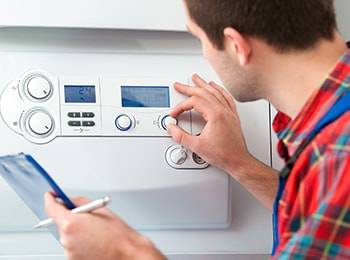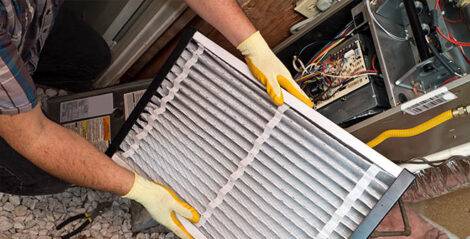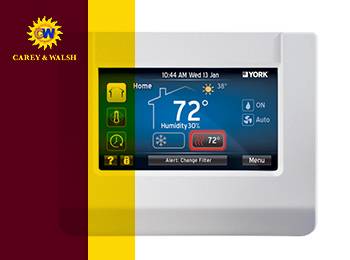
Facing New York’s harsh winters requires a well-maintained heating system. Discover essential tips to optimize your heating performance, reduce energy bills, and maintain a comfortable environment all winter long.
10 Furnace Maintenance Tips for Home and Business Owners in New York
1. Regular Air Filter Replacement
Consistently changing or cleaning your heating system’s filters, ideally every 1-3 months, is crucial. This not only improves air quality by removing contaminants and allergens but also enhances your system’s efficiency. A clean filter allows for better airflow, reducing the workload on your system, leading to lower energy costs, and prolonging the system’s lifespan.

2. Annual Professional Inspection
Annual heating maintenance by a qualified HVAC technician is key to preserving your system’s health. During this inspection, the technician can uncover and resolve issues such as leaks, rust, or general wear and tear. This preventive measure ensures your system operates at peak performance and safety, avoiding costly breakdowns and dangerous situations.
3. Thermostat Calibration
Making sure your thermostat accurately reflects the actual temperature is essential for efficient heating. Incorrect thermostat readings can cause your system to overwork, leading to increased energy bills. Upgrading to a smart thermostat can offer more precise control, adapt to your schedule, and provide significant energy savings through customizable and programmable temperature settings.

4. Seal Drafts and Leaks
Inspect your property for any drafts or leaks around windows, doors, and ductwork. These can cause significant heat loss, leading to your system working harder and thus increasing your heating bills. Properly sealing these areas helps maintain consistent temperatures, enhances comfort, and contributes to energy conservation.
5. Clean Heating Vents and Registers
Dust and debris accumulation in vents and registers can impede airflow and reduce system efficiency. Regular cleaning not only improves heating performance but also ensures better indoor air quality, reducing the risk of respiratory issues and allergies.
6. Inspect and Clean Chimneys and Flues
For heating systems equipped with chimneys or flues, it is imperative to have them inspected and cleaned annually. Additionally, consider a professional duct cleaning service, especially if your system includes a network of ducts. This service removes accumulated dust, debris, and potential blockages, enhancing airflow and efficiency, and is crucial for maintaining indoor air quality.
7. Test Carbon Monoxide Detectors
Carbon monoxide is a silent killer, and functioning detectors are your first line of defense, especially in buildings with gas heating systems. Testing these detectors regularly and replacing their batteries annually is a simple yet potentially life-saving practice.
8. System Upgrades
If your boiler, furnace, or heat pump is outdated, consider an upgrade. Modern, energy-efficient heating systems not only reduce your carbon footprint but are also more cost-effective in the long run. They offer improved reliability and performance, and many come with features that enhance user-friendliness and environmental sustainability.
9. Bleed Radiators
For those with hot water radiator systems, bleeding them at the onset of the heating season is vital. This process removes trapped air that can hinder heat distribution, ensuring your system operates efficiently and heats your space evenly.
10. Educate on the Proper Use
Understanding how your HVAC system functions and educating those in your home or business about its proper use is crucial for efficient operation. Misuse or overuse can lead to unnecessary strain and increased costs. Utilizing programmable settings to lower the heat when the property is unoccupied or during the night can lead to significant energy savings without compromising comfort.
By adhering to these expanded maintenance tips, homeowners and business owners in New York can ensure their heating systems function effectively, safely, and economically throughout the harsh winter months.
10 Signs That Your Heating System Needs Service
Determining when your heating system requires servicing is crucial for maintaining a comfortable, safe, and energy-efficient home or business environment. Here are ten key indicators that your heating system may need professional attention:
- Unusual Noises
- Inconsistent Heating
- Increased Energy Bills
- Frequent Cycling
- Poor Air Quality
- Strange Smells
- Age of the System= 10+yrs
- Visible Signs of Wear
- Carbon Monoxide Alerts
- Difficulty Starting the System
Unusual Noises
If your heating system starts making unusual noises like banging, whistling, or grinding, it’s a sign that something is amiss. These sounds can indicate issues like loose parts, airflow obstructions, or mechanical wear and tear.
Inconsistent Heating
When some rooms are too hot while others remain cold, or if you notice your heating system struggling to maintain a consistent temperature, it may need servicing. This can be due to problems with the thermostat, ductwork, or the heating system itself.
Increased Energy Bills
An unexpected rise in your energy bills can signal that your heating system is losing efficiency. This often happens due to the system working harder to produce the same amount of heat, possibly due to issues like dirty air filters, leaks in the ductwork, or an aging system.
Frequent Cycling
If your heating system is turning on and off more frequently than usual, it could be an indication of a malfunction. This cycling can be caused by incorrect thermostat settings, a faulty thermostat, or other mechanical issues.
Poor Air Quality
An increase in dust or a change in indoor air quality can be linked to your heating system. Issues like dirty filters, poor ventilation, or mold and mildew buildup in the system can contribute to this problem.
Strange Smells
Unusual odors emanating from your heating system, especially a burning smell, should not be ignored. These can indicate overheating, electrical issues, or, in more severe cases, a fire hazard.
Age of the System
Heating systems typically have a lifespan of 15-20 years. If your system is nearing or has surpassed this age, it may require more frequent servicing, or you might consider upgrading to a more efficient model.
Visible Signs of Wear
Physical signs such as rust, corrosion, or other damage to your heating system or its components can indicate a need for servicing.
Carbon Monoxide Alerts
If you have a gas furnace and your carbon monoxide detector goes off, it is a clear sign that your heating system needs immediate attention. Carbon monoxide is a dangerous gas that can be fatal if not addressed promptly.
Difficulty Starting the System
If your heating system takes longer to start up or doesn’t start at all, this can indicate a range of issues, from minor electrical problems to more serious mechanical failures.
How Often Should a Heating System Be Serviced?
Your heating system should generally be serviced annually, ideally before the onset of the winter season. This frequency ensures optimal performance, safety, and energy efficiency. However, certain factors might necessitate more frequent servicing, such as the age of the system (older systems may require more attention), type of system (e.g., heat pumps might need bi-annual servicing due to their year-round use), and specific manufacturer recommendations. Additionally, if your system is under heavy usage, such as in commercial settings, consider more frequent check-ups.
What Does Heating Maintenance Include?
Furnace maintenance typically includes a comprehensive check of your entire heating system. This service generally involves:
- Cleaning or replacing filters to ensure efficient airflow and improved air quality.
- Inspecting the heating unit for signs of wear and tear, mechanical issues, and electrical connections.
- Testing thermostat calibration to ensure accurate temperature control.
- Check and seal ductwork for leaks, which can lead to energy loss.
- Inspecting fuel connections, burners, and heat exchangers to ensure safe and efficient operation is particularly important for gas and oil systems.
- System controls and safety devices should be evaluated to ensure proper operation.
- Lubricating moving parts to reduce friction and wear.
- Checking and cleaning the blower to maintain adequate airflow.
- Inspecting and cleaning vents and flues to prevent blockages and ensure proper ventilation.
How Do I Prepare My Furnace for the Winter?
Preparing your furnace for winter involves several key steps:
- Change the Filter: Start by replacing or cleaning the furnace filter. This should be done every 1-3 months during the heating season.
- Test the Thermostat: Ensure your thermostat is working correctly. Turn it to the heat setting to check if the furnace kicks in.
- Clean the Furnace Area: Keep the area around your furnace clear and clean. Remove any flammable material from the vicinity.
- Inspect the Vents: Check all vents and registers in your home to make sure they’re not blocked or covered.
- Schedule Regular Maintenance: Have a professional HVAC technician inspect and service your furnace. This will include a thorough check of the system, cleaning, and any necessary repairs or adjustments.
- Test Carbon Monoxide Detectors: Make sure your carbon monoxide detectors are working correctly, as furnaces can leak this deadly gas.
- Review Safety Procedures: Familiarize yourself with the furnace’s operation manual and safety features.
Secure Your Comfort with Carey & Walsh 👩🔧🌟
Ready for a cozy, worry-free winter? Schedule your heating system maintenance with Carey & Walsh today! Our expert team ensures your home or business stays warm, efficient, and safe. Trust us for top-notch service and peace of mind. Contact us and embrace a warmer, more reliable winter season. Your comfort is our commitment.


